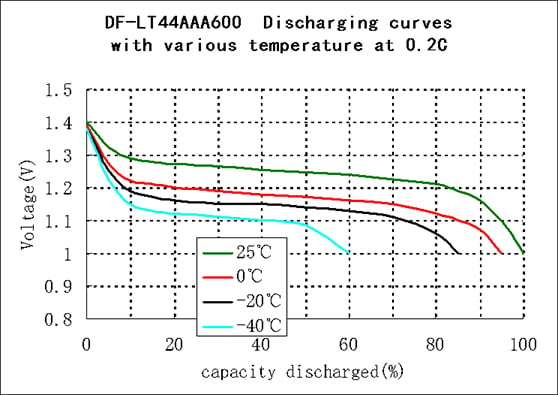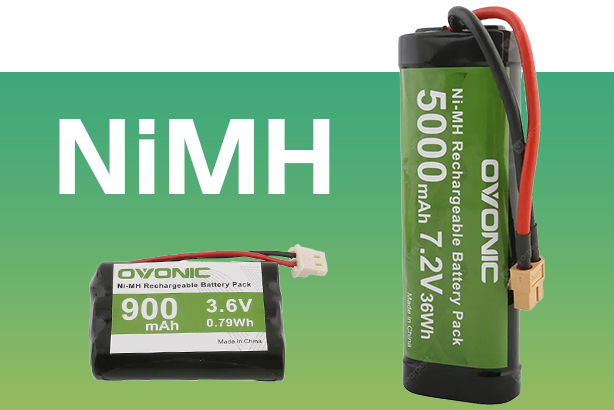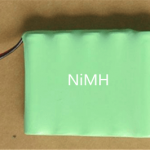Are you unfamiliar with RC NiMH batteries on the market? Then you’ve come to the right place. This article provides information on the voltage, size, and discharge performance of NiMH batteries that will be useful to you. In addition, NiMH and Lipo are compared in detail, and you can choose a suitable battery according to these.
NiMH Battery Voltage Chart
| Cell | 1s | 2s | 3s | 4s | 5s | 6s | 7s | 8s |
| Rated Voltage(V) | 1.2 | 2.4 | 3.6 | 4.8 | 6 | 7.2 | 8.4 | 9.6 |
| Fully Charged Voltage(V) | 1.4 | 2.8 | 4.2 | 5.6 | 7 | 8.4 | 9.8 | 11.2 |
| Minimum Safe Voltage(V) | 0.9 | 1.8 | 2.7 | 3.6 | 4.5 | 5.4 | 6.3 | 7.2 |
NiMH is chemically more stable than Lipo, so there is no need to set the storage voltage.
Discharge curve of NiMH battery

The above data are the results tested at ambient temperatures of 25°C, 0°C, -20°C, and -40°C, respectively. As can be seen from the chart:
When the NiMH discharge voltage is lower than 1.1V, its power decreases rapidly. So in practice, we usually set the cutoff voltage of RC cars running NiMH to 0.9V. When it is close to 0.8V, it means that the power is almost exhausted. If you continue to use it, it will cause irreversible damage to the battery.
Besides, the ambient temperature has a great influence on the discharge performance of NiMH. Because the electrochemical reaction of NiMH is related to the ambient temperature. For example:
- As the temperature decreases, the reaction rate of the electrode also decreases.
- The battery voltage remains constant, the discharge current decreases, and the power output of the battery decreases.
- The opposite is true when the temperature rises, that is, the output power of the battery will increase, and the temperature will also affect the transmission speed of the electrolyte.
- Temperatures above 45°C can disrupt the chemical balance within the battery, causing side reactions and damaging the battery.
NiMH Battery Size Chart
| Series | Diameter(mm) | High(mm) | Capacity(mAh) |
| AAAA | 8.2 | 40 | ≤300 |
| AAA | 10 | 43 | ≤700 |
| 10.1 | 43 | ≤1000 | |
| AA | 13.9 | 49 | ≤1600 |
| 14.1 | 50 | ≤2500 | |
| A | 16.6 | 50 | ≤2500 |
| SC | 21.9 | 43 | ≤3000 |
| C | 25.2 | 49 | ≤5000 |
| D | 32.2 | 60 | ≤11000 |
| F | 32.2 | 90 | ≤14000 |
NiMH vs Lipo
NiMH battery
Pros
- Low cost
- Strong versatility
- Safer
- Good fast charging performance
Cons
- Has memory effect
- High internal resistance
- Short service life
Lipo battery
Pros
- Light, small
- High energy density
- High discharge voltage
- Low self-discharge rate
- High and low-temperature adaptability
Cons
- High cost
Frequently Asked Questions
Q: What is the service life of NiMH batteries?
A: The cycle life of NiMH rechargeable batteries can reach 500 times. They can be used for more than 5 years as long as they are not abused. Although the memory effect of NiMH batteries is small, I still recommend that you try to recharge them after each use, and charge them all at once. This extends the life of the battery.
Q: NiMH or Lipo, which is better?
A: As mentioned above, they each have their pros and cons. If you’re a beginner, NiMH batteries not only save your budget, but the stable chemistry prevents you from abusing them. When you are familiar with RC batteries and want to improve the driving performance of your vehicle, then lipo batteries are your best choice.



